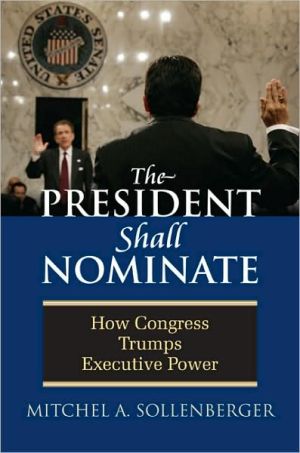

 |

|

Sold Out
Book Categories |
Acknowledgments xiii
Introduction 1
The Pre-nomination Process 3
Additional Concerns of This Study 3
Existing Research 5
Organization of This Book 6
Constitutional Principles 8
Continental Congress 8
State Constitutions 12
Constitutional Convention 13
State Ratification Conventions 16
The Federalist Papers 19
Correspondence between John Adams and Roger Sherman 20
Establishing the Pre-nomination Process (1789-1829) 22
Senatorial Courtesy 23
The Rejection of Benjamin Fishbourn 24
James Iredell and the Consent of Senator Benjamin Hawkins 30
William Maclay and Home-State Support 30
George Washington (1789-1797) 31
John Adams (1797-1801) 33
Thomas Jefferson (1801-1809) 35
James Madison (1809-1817) 37
James Monroe (1817-1825) 39
John Quincy Adams (1825-1829) 43
The Spoils Era I (1829-1845) 47
Andrew Jackson (1829-1837) 47
Martin Van Buren (1837-1841) 55
William Henry Harrison (1841) 59
John Tyler (1841-1845) 62
The Spoils Era II (1845-1869) 67
James K. Polk (1845-1849) 68
Zachary Taylor (1849-1850) 71
Millard Fillmore (1850-1853) 72
Franklin Pierce (1853-1857) 73
James Buchanan (1857-1861) 76
Abraham Lincoln (1861-1865) 78
Andrew Johnson (1865-1869) 80
Birth of Civil Service Reform (1869-1881) 86
Ulysses S. Grant (1869-1877) 86
Rutherford B. Hayes (1877-1881) 94
James A. Garfield (1881) 101
The Pendleton Act: Patchwork Reform (1881-1897) 105
Chester A. Arthur (1881-1885) 105
Grover Cleveland (1885-1889) 111
Benjamin Harrison (1889-1893) 118
Grover Cleveland (1893-1897) 122
McKinley to Ford: The Tradition Continues (1897-1977) 126
William McKinley (1897-1901), Theodore Roosevelt (1901-1909), and William Howard Taft (1909-1913) 126
Woodrow Wilson (1913-1921) 131
Warren G. Harding (1921-1923), Calvin Coolidge (1923-1929), and Herbert Hoover (1929-1933) 132
Franklin D. Roosevelt (1933-1945) 135
Harry S Truman (1945-1953) 137
Dwight D. Eisenhower (1953-1961) 138
John F. Kennedy (1961-1963) and Lyndon B. Johnson (1963-1969) 139
Richard M. Nixon (1969-1974) 142
Gerald R. Ford (1974-1977) 145
Carter to Bush II: A Lasting Legacy (1977-2007) 147
Jimmy Carter (1977-1981) 147
Ronald Reagan (1981-1989) 150
George H. W. Bush (1989-1993) 153
William J. Clinton (1993-2001) 156
George W. Bush (2001-2007) 160
Analysis and Conclusions 169
Republicanism and Constitutional Legitimacy 170
The Practical Duty to Consult 171
Institutional and Political Influences 171
Participation in the Pre-nomination Process 173
Failure to Consult: Congressional Responses 174
Congressional Specification of Qualifications 176
Nonstatutory Limits to the President's Appointment Power 180
Reformers Seeking Nonpolitical Remedies 181
Rise of the Unitary Executive School 182
Interpretive Value of Originalism and Textualism 185
Final Remarks 189
Notes 191
Bibliography 269
Index 293
Login|Complaints|Blog|Games|Digital Media|Souls|Obituary|Contact Us|FAQ
CAN'T FIND WHAT YOU'RE LOOKING FOR? CLICK HERE!!! X
 You must be logged in to add to WishlistX
 This item is in your Wish ListX
 This item is in your CollectionThe President Shall Nominate: How Congress Trumps Executive Power
X
 This Item is in Your InventoryThe President Shall Nominate: How Congress Trumps Executive Power
X
 You must be logged in to review the productsX
 X
 X

Add The President Shall Nominate: How Congress Trumps Executive Power, The Constitution clearly states that the president shall nominate, and by and with the advice and consent of the Senate, shall appoint individuals to positions in the executive and judicial branches; yet the process may sometimes seem murky. While much , The President Shall Nominate: How Congress Trumps Executive Power to the inventory that you are selling on WonderClubX
 X

Add The President Shall Nominate: How Congress Trumps Executive Power, The Constitution clearly states that the president shall nominate, and by and with the advice and consent of the Senate, shall appoint individuals to positions in the executive and judicial branches; yet the process may sometimes seem murky. While much , The President Shall Nominate: How Congress Trumps Executive Power to your collection on WonderClub |